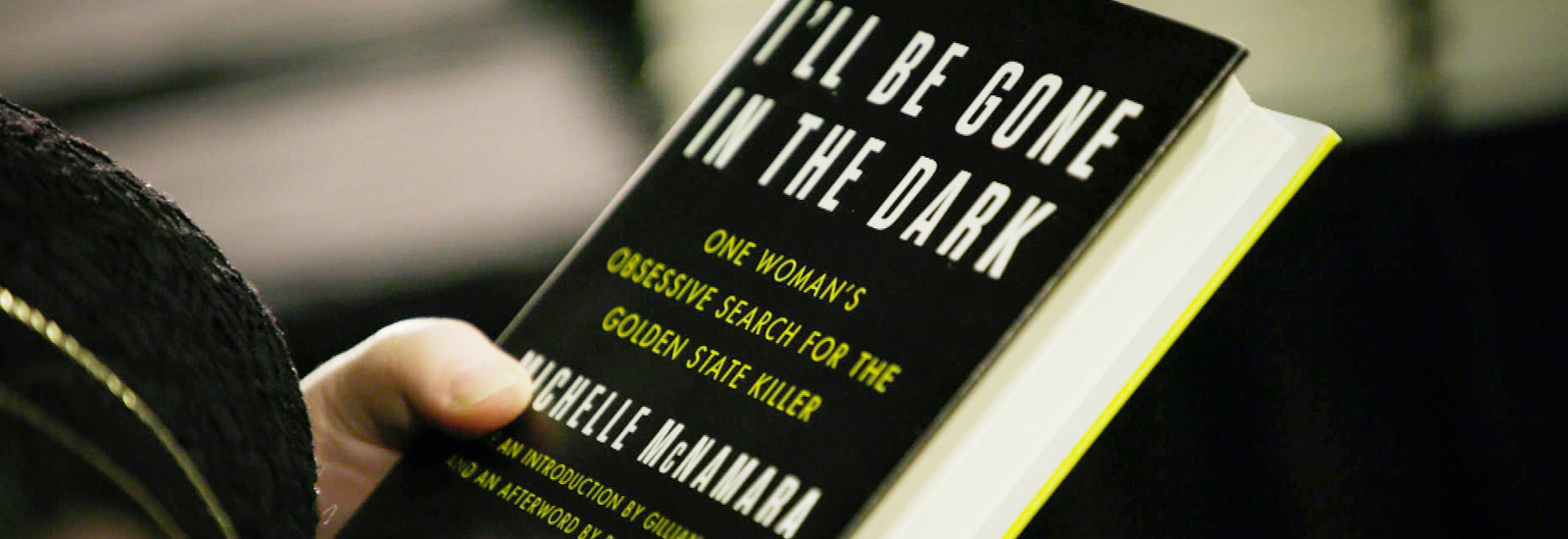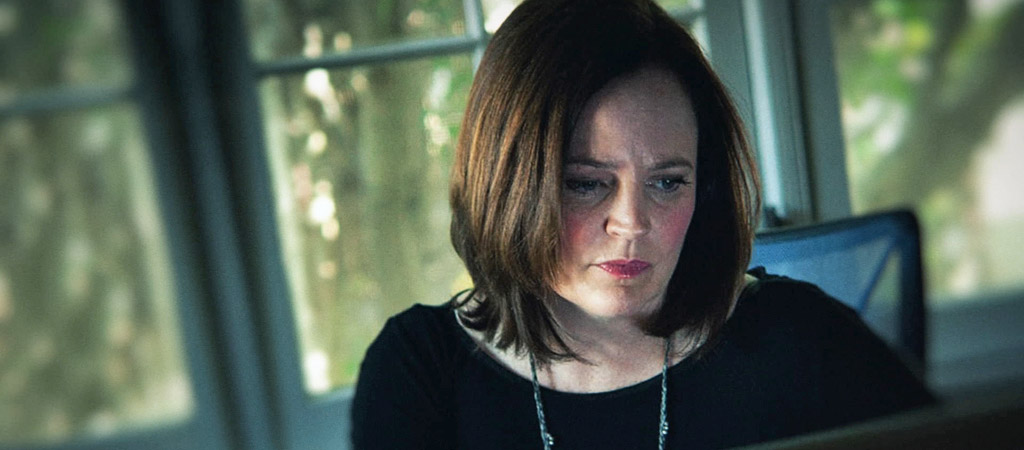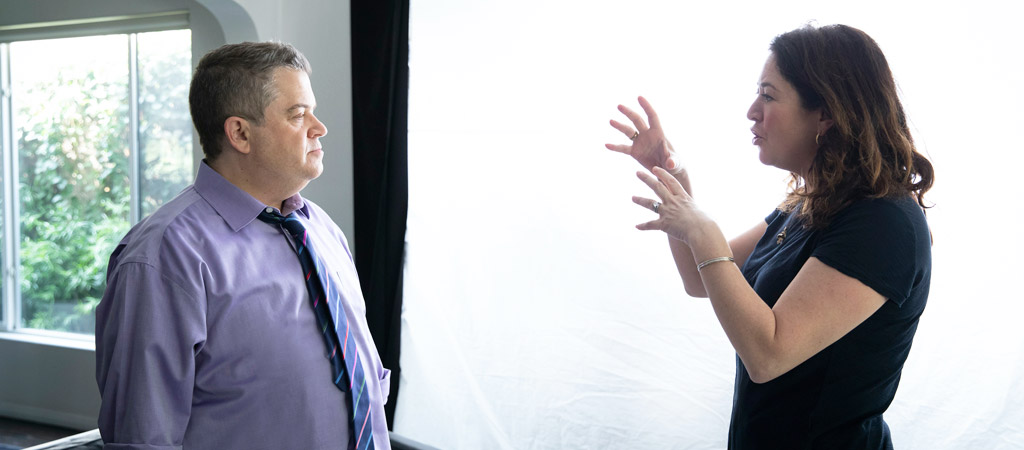
I’ll Be Gone In The Dark, the 2018 true-crime masterpiece by the late Michelle McNamara, will land on a TV near you this weekend with a few additional layers. The book, of course, helped nab the Golden State Killer, who terrorized California in the 1970s and 80s, leaving a trail of 50 rapes and 12 murders in his wake. Michelle, who passed away in 2016, didn’t live to see the arrest of Joseph James DeAngelo, although there’s no question that her dogged pursuit of the truth, as well as the public awareness that she generated for the cold case, led to renewed law enforcement action that finally brought results. That process, along with much of the book, is detailed in a six-part HBO docuseries that takes its title from the McNamara-penned source material.
The HBO project is epic in its scope, not only following much of the book’s content but also including interviews from survivors, investigators, and McNamara’s husband, Patton Oswalt. True crime fans will find themselves unable to stop watching, and Michelle’s own obsession with unsolved cases — and her non-sensationalized, empathetic treatment of the subject matter — is clear to anyone who’s read the book. The series not only dives into Michelle’s soul but also layers in archival footage and police files, along with anecdotes about her life. Director Liz Garbus (Love, Marilyn, What Happened, Miss Simone?) was nice enough to speak with us about how this docuseries came together.
Even the opening credits of this docuseries are gripping. I can’t think of a better mood-setter than a cover of Leonard Cohen’s “Avalanche.” How did you decide upon that song?
The cover is performed by Aimee Mann, who was a friend of Michelle and Patton. And if you know the song, you know it’s rather apt for the kind of ghost that haunts the series, but we felt that kind-of flipping the switch and having it in a female voice was appropriate and haunting for our show.
There are so many Cohen covers out there, but this one really hits the mark and sets a mood for what’s to come.
Oh good. We were really thrilled that she did it and with the performance.
You started work on this docuseries before Michelle’s book was published, yes?
You are right. HBO sent me a manuscript of the book before it was published, and I didn’t know much about the case at all. It was probably somewhere deep in my brain, but I hadn’t followed it closely. I think people were less aware of it, or people like myself anyway, and I was just really drawn in by Michelle: by her voice, by her ability to inhabit the world of her survivors. And my hair would stand up while I was reading it, but at the same time, I could feel her tremendous empathy. And also, at the heart of this story was this woman, the artist, who I felt that I identified with. And I just felt like really excited it on, not really as a crime story but really as a portrait of a woman, and a portrait of an artist, and that’s what really lured me in.
This is not only a crime story but a celebration of Michelle’s work, and also a cautionary tale on prescription drug addiction, so how did you strike a balance?
I think that was the challenge: balancing Michelle as an artist, who’s maturing and becoming a wife and a mother with a career, and managing all of those stretches with pills, and then, of course, she succumbs to them, and that kind of narrative. And interweaving it with the narrative of the survivors, not only the trauma of the crimes but also the trajectory of what happens in years after, with their relationships, how they were able to talk about or not talk about this. Then there’s law enforcement and their hunt for the perpetrator, and these threads are interwoven throughout, and that was really the challenge and the joy of it.
Michelle’s blog was wildly popular, and the book took off. So many people have theories on why true crime is so fascinating. Why do think our culture is so obsessed with it?
I definitely think a lot about it, and I know that Michelle thought a lot about it. I think it’s interesting to note that women are particularly part of this audience, and I guess I wonder if women being vulnerable in this world or often victims of domestic violence or other types of sexual violence, if it’s almost like a safety valve, where you can explore your greatest fears in a way that’s controllable? You can turn it off when you close the book. But I also think that storytellers and readers and audiences have always been interested with the most extreme, transgressive types of human behavior. It helps to kind-of understand the outer limits of humanity, and it’s inherently interesting. And it’s interested writers and poets since the beginning. Perhaps in this moment in our society, it’s taken on a bigger spotlight.

The book and the series both touch on how, in the 1970s, rape was not a felony. It was treated like a simple assault, and women were outright blamed in messaging for becoming victims. We’ve made progress, but do you feel that it’s enough?
Yes and no. Things have evolved. It was seen as a misdemeanor, a simple assault, and one of our subjects talks about being processed by male officers and her body being treated like a crime scene. Of course, that still happens in some cases, and in some cases, it doesn’t. And obviously, rape is now a felony, but a lot of rapes go unreported with women fearing not being believed, so there’s a lot of work to do. What I found great is that the survivors in this series, many of whom have been quiet for so long because of shame or stigma, or just social norms from when they were kids, that they decided to come forth and talk about it, and share with their family members. Because holding these kind of things back in private is too much on a person, and you need other people, you need your loved ones to be able to be there for you, so that was a wonderful thing, seeing those folks persevere in that journey.
It was striking, too, how when DeAngelo was arrested, the reaction from some of the survivors was like, “Really… him?”
Right, and Michelle predicted that. She said that it’s [a predator’s] actions that make them so powerful, and then you see that they’re Bob, or Bill, or in this case, Joe. Just some pasty old guy who’s barely worth your thoughts, you know?
And with that “Letter To The Old Man” that Michelle wrote in her book, how did you decide exactly where to put it in the series?
I think that the letter is such a prescient, powerful piece of writing, and she predicts so many things about what would happen in that letter, so we put it in a very special part of the series. It shows Michelle’s power and prowess, so it was very important for us to include it and dramatize it, very specifically.
You had cameras rolling when the team (including Patton) found out about the arrest. That timing.
It was crazy, that night — the first night of shooting — we went to Chicago. It was really early days of the project, and we thought we were just going to get to know [each other]. Patton was doing a book reading in Chicago, and we were all going to meet Michelle’s relatives, and then we filmed the reading, and then went to sleep. We woke up in the morning to text messages blowing up the phone about a suspect arrested. My camera crew had already boarded a flight to another city, and we shot Patton with an iPhone, and we were all booked on different flights back to New York, and then Patton was booked on Seth Meyers, and we were able to regroup with a different photographer and shoot them watching the press conference and their first reactions, so it was really a wild 24 hours.
Patton’s mentioned in the book, and he was obviously a huge supporter of Michelle’s work, so how did you decide how much of him to include?
Patton was always clear in that “this is not about me.” We agreed, and I think he was able to shed incredible light onto Michelle’s character, onto their initial romance, which made some great stories, and into struggle with writing, being a mom, and all those things. So, he was really there in service of Michelle’s story, and he never wanted anything more than that, so it really wasn’t that hard.

To wrap up here, DeAngelo is expected to plead guilty on June 29th.
Yes. The day after the premiere. His journey through the justice system is what really bookended our production. I hope that he does plead guilty, and that happens, for the survivors who were not named in the current suit. It’s really important for them and their closure, so I do hope that it goes through.
HBO’s ‘I’ll Be Gone In The Dark’ premieres on Sunday, June 28 at 10:00pm EST.
